
Powerful photograph from the #Quetta blast site where more than 90 were killed. Blood spilled over a book. #RIP: image via Aditya Raj Kaul Verified account @Aditya RajKaul, 8 August 2016
Pakistani local journalists react over the body of a news cameraman after a bomb explosion at a government hospital premises in Quetta on Monday: photo by Banaras Khan/AFP, 8 August 2016
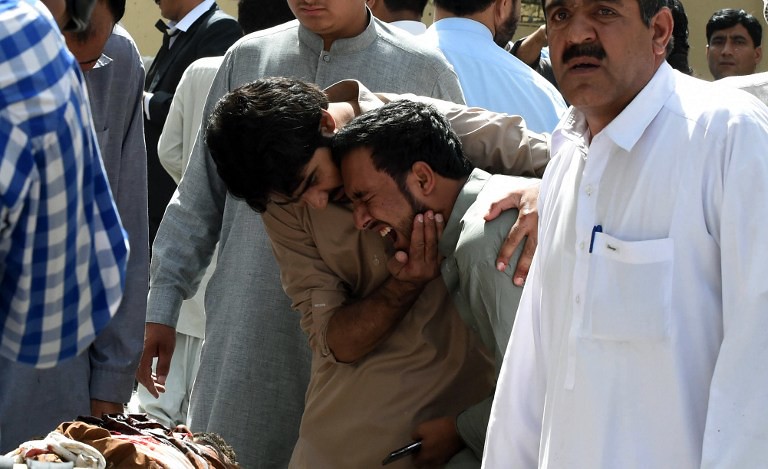
Local journalists react after the killing of a news cameraman, Civil Hospital, Quetta [photo Banaras Khan / AFP]: image via alhkaleej online, 8 August 2016
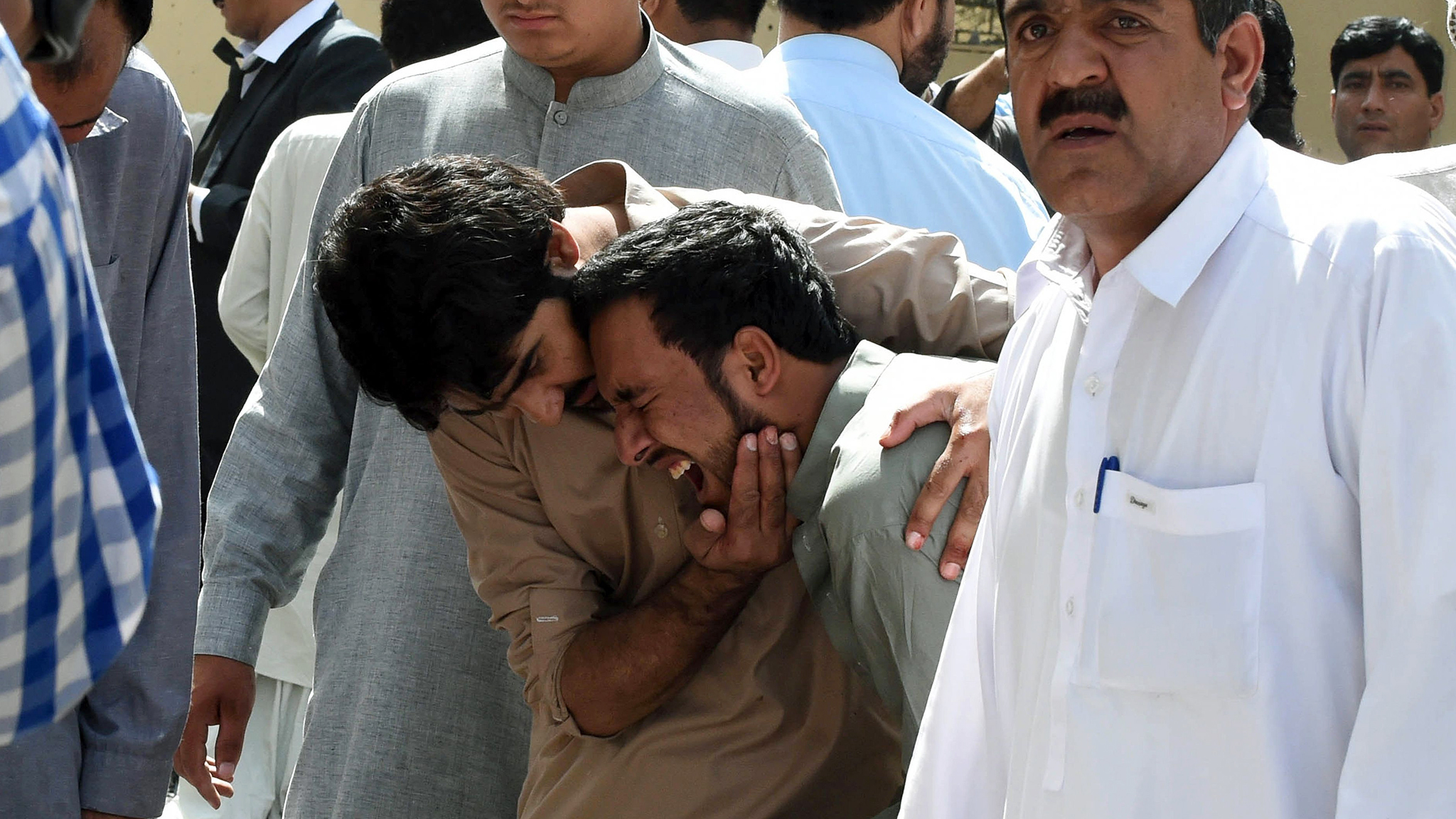 .
.Local journalists react over the body of a news cameraman after a bomb explosion at a government hospital premises in Quetta on Monday: photo by Banaras Khan/AFP, 8 August 2016
Death toll in Quetta bombing rises to 93, says provincial Health minister Rehmat Baloch: tweet via Ihsan Tipu Mehsud @IhsanTipu, 8 August 2016

Y only Pashtun have 2 live as IDP in camps, killed by Taliban, humiliated by Army and dragged by police in Islamabad? [photo @AFP]: image via Pashtoon Khan @Pashtoonkhan, 9 August 2016 Punjab, Pakistan
A splinter group of Pakistani Taliban has claimed responsibility for Quetta bombing. #Pakistan: tweet via Salman Masood @salmanmasood, 8 August 2016

#Amaq Multiple claims of Quetta bombing. After Taliban, IS claims the attack: tweet via Salman Masood @salmanmasood, 9 August 2016
IS claim could be just an extension as splinter Taliban group expressed support for it in the past: tweet via Salman Masood @salmanmasood, 8 August 2016

#Pakistani military checkout on every 500 meters, #Taliban Chief and rest in safe house. #PakistanIsIsis: image via Meerain Baloch @meerinjo, 8 August 2016

#Pakistani military checkout on every 500 meters, #Taliban Chief and rest in safe house. #PakistanIsIsis: image via Meerain Baloch @meerinjo, 8 August 2016

Mourners on Monday after the hospital attack in Quetta. The blast occurred shortly after the body of a prominent lawyer, killed by gunmen earlier in the day, had been transferred to the hospital.: photo by Banaras Khan/Agence France-Presse, 8 August 2016

Pakistani relatives mourn next to bodies of victims after a bomb explosion at a government hospital premises in Quetta: photo by Banaras Khan / AFP, 8 August 2016
 .
. Mourners on Monday after the hospital attack in Quetta. The blast occurred shortly after the body of a prominent lawyer, killed by gunmen earlier in the day, had been transferred to the hospital.: photo by Banaras Khan/Agence France-Presse, 8 August 2016

#QuettaBlast in #Balochistan is an act of disrespecting Human Dignity and basic Human Values. Condemnable.: image via HRCB @HrcBalochistan, 8 August 2016

The so called leaders of #Balochistan sitting in #Islamabad Stooges of Pakistan Army killers of Baloch and Pashtuns: image via #Human @ShahidQazi1, 8 August 2016

Where are Human Rights champions? #QuettaAttack #BalochGenocide: image via Walíd Lái Balóc @waleed_balouch, 8 August 2016

Army not allowing families to see dead bodies of their loved ones due to the protocol of Raheel Sharif. #QuettaBlast: image via Faiz Baluch @Faiz_Baluch, 8 August 2016

Real face of world class terrorist provider #Pakistan: image via Meerain Baloch @meerinjo, 8 August 2016
94
educated #Baloch and #Pakthun killed by the the #Pakistani Army jihadi
wings. Army will arrest thousands innocent in #Baloch areas.: tweet via Meerain Baloch @meerinjo, 8 August 2016

Pakistani
journalists in Karachi carry placards during a protest against the killing of
their colleagues and lawyers in a suicide bombing at a hospital in
Quetta: photo by Rizwan Tabassum/AFP, 8 August 2016

PAKISTAN - Rally in Lahore to pay tribute to a news cameraman killed in a suicide bombing in Quetta By Arif Ali @AFP: image via Frédérique Geffard @fgeffardAFP, 8 August 2016

PAKISTAN - Pakistani victims injured in a suicide bombing are treated at a hospital in Quetta. By Banaras Khan #AFP: image via Frédérique Geffard @fgeffardAFP, 8 August 2016
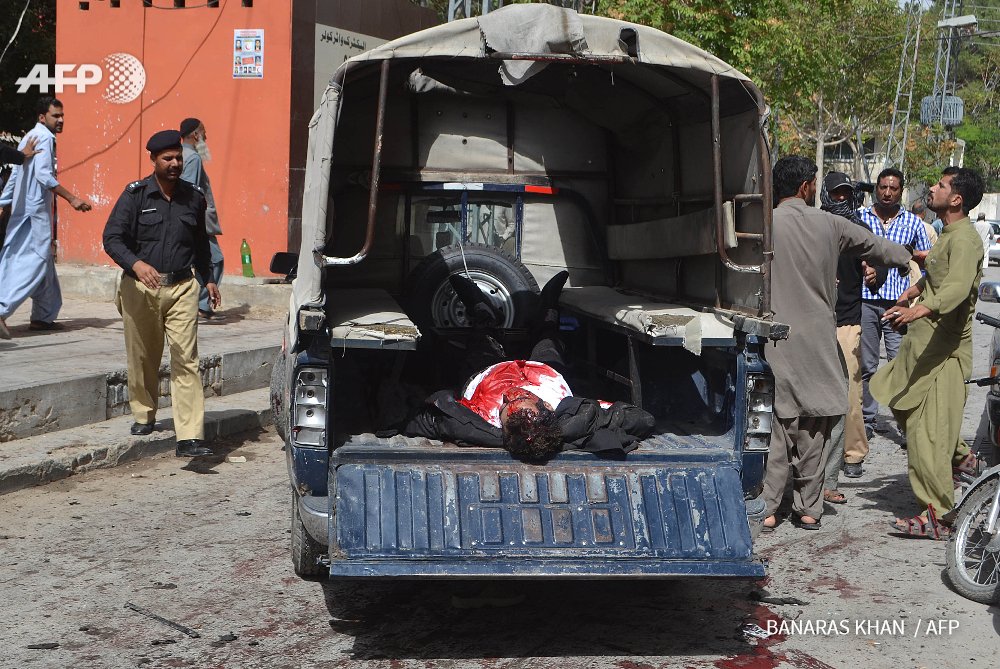
The body of a Pakistani lawyer lies in a police van after a bomb explosion at a hospital in Quetta; by Banaras Khan: image via AFP Photo Department @AFPphoto, 8 August 2016

Men react at the site of a bomb explosion at a government hospital in Quetta, Pakistan: photo by Banaras Khan / AFP, 8 August 2016

Pakistani lawyers and local media personnel carry a bed to move the body of a news cameraman after a bomb explosion at a government hospital in Quetta: photo by Banaras Khan / AFP, 8 August 2016

Pakistani relatives mourn next to bodies of victims after a bomb explosion at a government hospital in Quetta: photo by Banaras Khan / AFP, 8 August 2016

Pakistani lawyers carry the body of a colleague on a stretcher after a bomb explosion at a government hospital in Quetta. A powerful bomb went off on the grounds of a government-run hospital Monday, killing dozens of people, police said.: photo by Banaras Khan / AFP, 8 August 2016

A Pakistani lawyer reacts as he stands near the bodies of colleagues killed in a bomb explosion at a government hospital premises in Quetta: photo by Banaras Khan / AFP, 8 August 2016
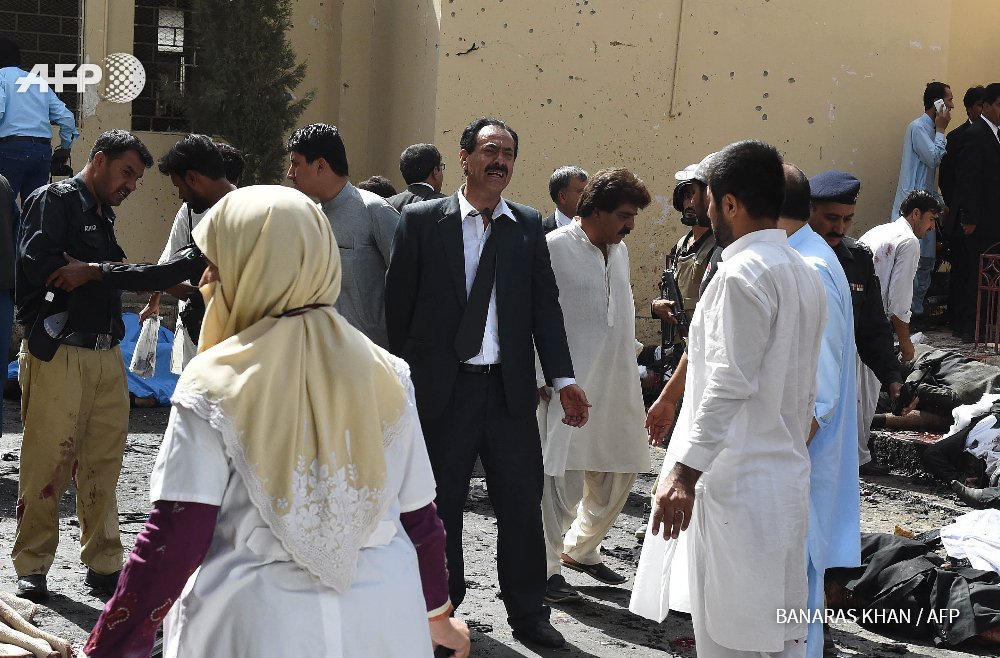
#UPDATE At least 40 people are killed after a bomb rips through a hospital in SW Pakistan: image via AFP news agency @AFP, 8 August 2016

People carry an injured lawyer to a hospital following a bomb blast in Quetta, Pakistan. A powerful bomb went off on the grounds of a government-run hospital Monday, killing dozens of people, police said.: photo by Arshad Butt / AP, 8 August 2016

A Pakistani paramedic carries injured lawyers to a hospital following a bomb blast in Quetta. A powerful bomb went off on the grounds of a government-run hospital Monday, killing dozens of people, police said.: photo by Arshad Butt / AP, 8 August 2016

Pakistani lawyers use a stretcher to move an injured colleague after a bomb explosion at a government hospital premises in Quetta: photo by Banaras Khan / AFP, 8 August 2016
Pakistan: dozens dead as bomb hits mourners at Quetta hospital: Explosion, reportedly killing at least 67, occurred as body of prominent lawyer, Bilal Kasi, arrived at hospital after he was shot: Taha Siddiqui in Islamabad and Saeed Kamali Dehghan for The Guardian, 8 August 2016
At least 67 people have been killed and another 100 injured after a suicide bomb packed with ball bearings tore through a crowded state-run hospital in Quetta, the capital of a region of Pakistan ravaged by insurgency and sectarian tensionsWitnesses described horrific scenes as victims cried out for help, and survivors scrambled to flee past bodies lying scattered in the smoke-filled corridors.
The blast on Monday appeared to have been a deliberate attempt to target some of Balochistan province’s most prominent lawyers, who had gathered at the hospital’s emergency department to mourn a colleague who shot dead earlier in the day in a separate incident. Bilal Kasi, the president of the Balochistan bar association, was targeted by two gunmen as he left his home for work.
Both Islamic State and Jamat-ul-Ahrar, an offshoot of the Pakistani Taliban, claimed responsibility for both attacks.
Victims of the hospital bombing included relatives of Kasi and at
least two journalists who had gone to the hospital to cover his death.
One
lawyer, Riaz Ahmed, 74, had gone to the hospital with an assistant and
his nephew to find out what had happened to Kasi when the blast
occurred. “I was near a wall and I fell down,” he told the Guardian by
phone.
“The wall protected me. My assistant and my nephew are injured and being treated. It was a miracle that I survived.
“The wall protected me. My assistant and my nephew are injured and being treated. It was a miracle that I survived.
“There was chaos after the blast, with body parts lying everywhere.
It is hard to recognise the victims. Many of the injured are quite
critical.”
Another lawyer, Jameel Ahmed, 48, said he headed for the hospital as
soon as he heard that Kasi, a friend, had been shot dead “I heard a loud
blast, then a colleague of mine called me from hospital,” he said. “I
have lost so many friends in a single attack. This is horrific. Many of
those who have died were with me last night. We had dinner together and
now they are all dead.
“I think the terrorists planned it so -- they knew that lawyers would
gather in large numbers at the hospital after the killing of Kasi, and
so they sent a bomber to attack.”
Monday’s blast was the latest in a string of vicious attacks against
lawyers in Balochistan, which is located in south-western Pakistan near
the border with Afghanistan. It has become a breeding ground of ethnic
separatist insurgency, where the minority Shia and Hazra community have
been targeted in the course of the past decade. Two other lawyers, Jahanzeb
Alvi and Amanullah Achakzai, were killed in August and in June
respectively by unknown gunmen in the same city.
The Quetta hospital attack was the second deadliest in Pakistan this year. In March, on Easter Sunday, 75 people were killed in a bombing targeting Christians near a bustling park in Lahore.
Attackers have previously used similar tactics to those seen on
Monday to kill people mourning at a hospital. In 2012, an attack outside
a Karachi hospital killed 13 people who had gathered for a victim of a
separate attack on the same day.
In an emailed statement to journalists, Jamat-ul-Ahrar said the the
group “will continue attacks in Pakistan till the establishment of
Islamic system in the country”. Jamat-ul-Ahrar, is a breakaway faction
of the Tehreek-e-Taliban Pakistan (TTP), and is based out of the tribal
areas near Pakistan and Afghanistan border. Earlier in the day,
Balochistan’s chief minister, Sanaullah Zehri, had blamed Indian
intelligence for being behind the attack.
The Isis-affiliated Amaq “news agency” also issued a statement claiming responsibility for the attack.
Pakistan’s prime minister, Nawaz Sharif, condemned the bombing,
expressing “deep grief and anguish over the loss of precious human
lives” before he arrived in Quetta to visit the hospital.
“No one will be allowed to disturb peace in the province that has
been restored due to countless sacrifices of security forces, police and
the people,” he said in a statement.
“This is an absolutely senseless targeting of dozens of people,
including patients and mourners,” said Champa Patel, Amnesty
International’s director for south Asia. “It has led to a devastating
loss of life, and is an example of the string of attacks in recent years
in Pakistan on schools, hospitals and other ‘soft targets’, which must
cease immediately.”
She added: “A full, independent and transparent investigation must be
carried out into how and why this bombing took place, and whoever is
responsible should be brought to justice as soon as possible in fair
trials, without recourse to the death penalty.”
According to the Express Tribune, a major English-language Pakistani newspaper, a spokesperson for the Balochistan regional government said that the attack following Kasi’s killing appeared to have been “pre-planned”.
A
spokesperson for the Pakistan army said on Twitter that the attack was
aimed at undermining security in Balochistan in the light of
China-Pakistan economic cooperation in the region.
The Quetta bomb disposal squad has issued a statement saying at least
eight kilograms of explosives were used along with ball bearings, to
inflict maximum damage. The official death toll stood at 67, while more
than 100 were injured. Facebook activated its safety check in the
aftermath of the attack, enabling users to notify friends about their
situation.
A journalist with the Pakistani television network Aaj News, Shehzad
Ahmed, and Dawn’s Mehmood Khan were among the victims. Dawn said in an article published on its website that Khan had risen to become a journalist after first working as a security guard at the media organisation.
An AFP journalist who was approximately 20 metres away from the blast
escaped injury. Describing the aftermath of the attack, he said: “There
were pools and pools of blood around and pieces of human bodies and
flesh ... people were beating their heads, crying and mourning. They
were in shock and grief.”
Lawyers around Pakistan have announced a country-wide strike, and
will not be attending courts on Tuesday. Pakistan’s chief of justice,
Anwar Zaheer Jamali, also issued a statement condemning the attack.

Don't fool yourself @NewPakistan2020 (Baloch of occupied #Balochistan holding the Balochistan flag proudly): image via PIRDHAN BALOCH @PIRDHAN BALOCH, 31 July 2016
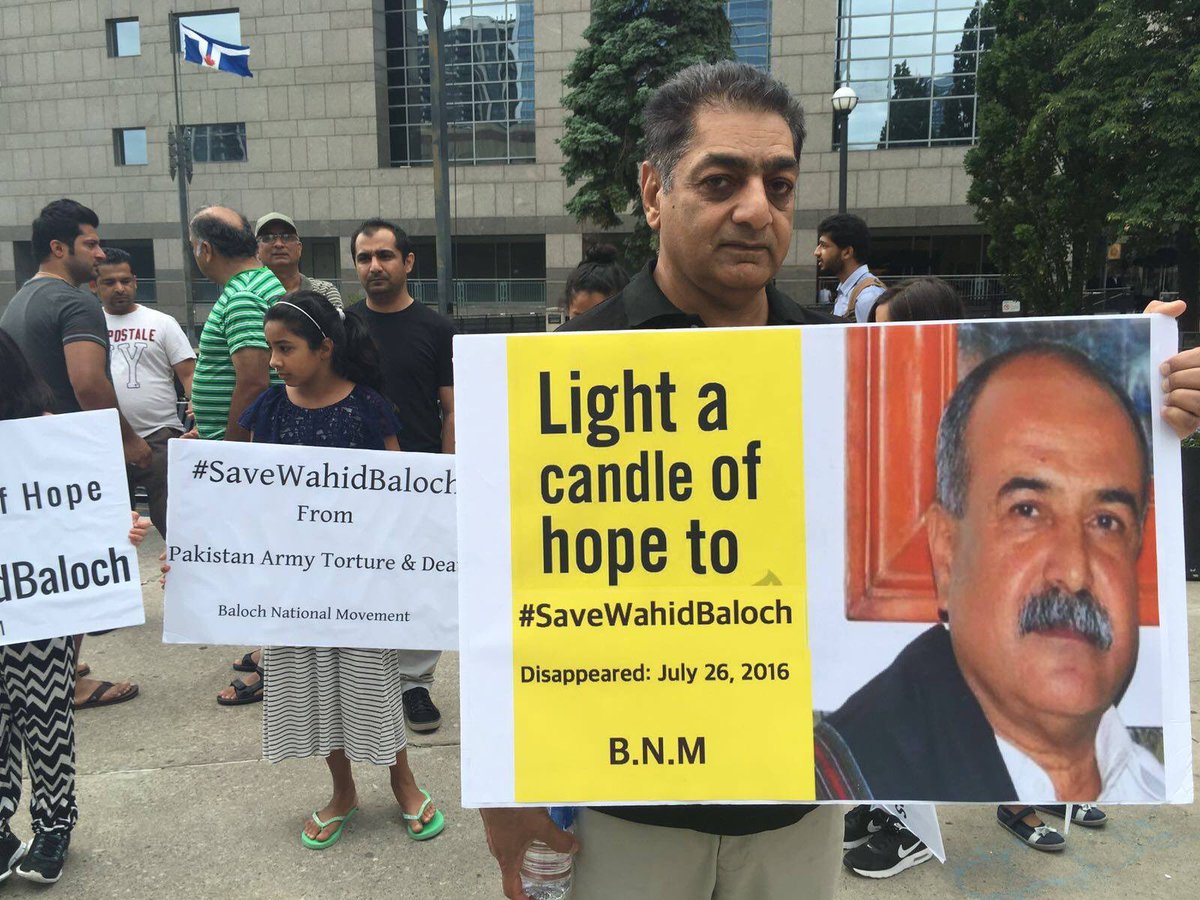
Canada: Baloch National Movement protests against the abduction of Wahid Baloch by the Pakistani forces: image via PIRDHAN BALOCH @PIRDHAN BALOCH, 31 July 2016

Killing humans is a biggest crime against humanity but Balochistan's humans r openly being killed by Pakiforces @hrw: image via Samreen Baloch @Samreen_Baloch1, 31 July 2016

Killing humans is a biggest crime against humanity but Balochistan's humans r openly being killed by Pakiforces @hrw: image via Samreen Baloch @Samreen_Baloch1, 31 July 2016

Killing humans is a biggest crime against humanity but Balochistan's humans r openly being killed by Pakiforces @hrw: image via Samreen Baloch @Samreen_Baloch1, 31 July 2016

Quetta: slide 31: image via RISHTACORNER, 8 August 2016
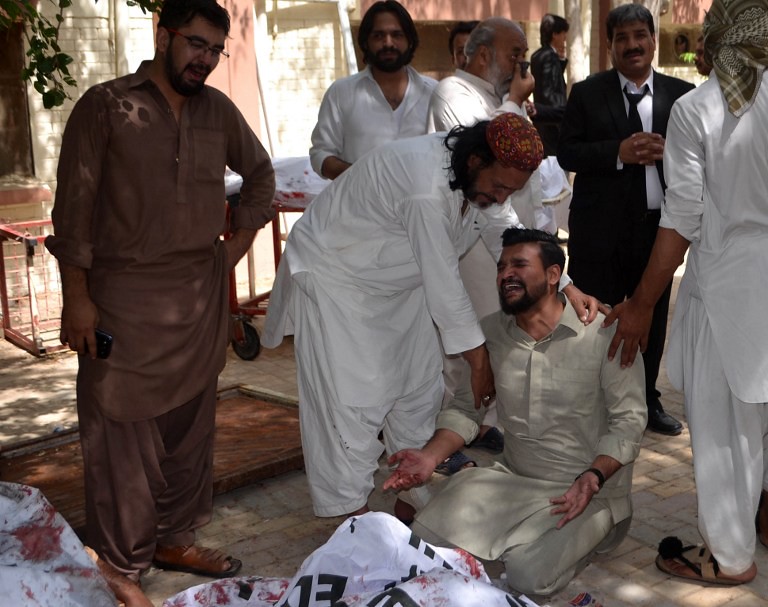
Relatives grieving over bodies of bombing victims, Civil Hospital, Quetta [photo Banaras Khan / AFP]: image via alkhaleej online, 8 August 2016
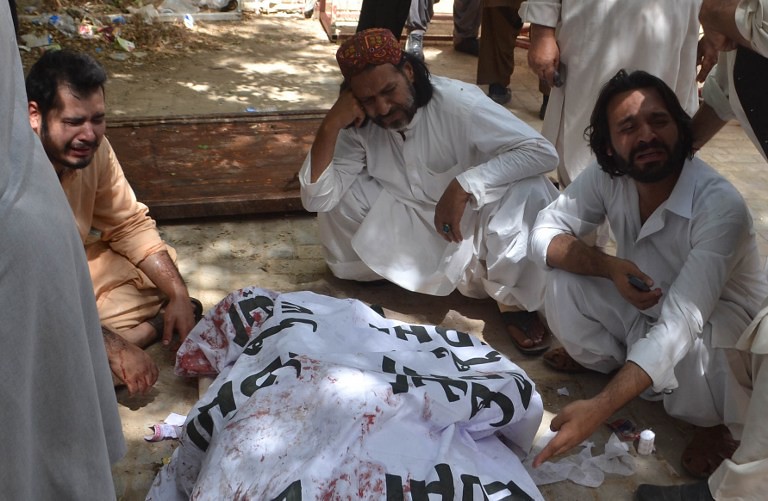
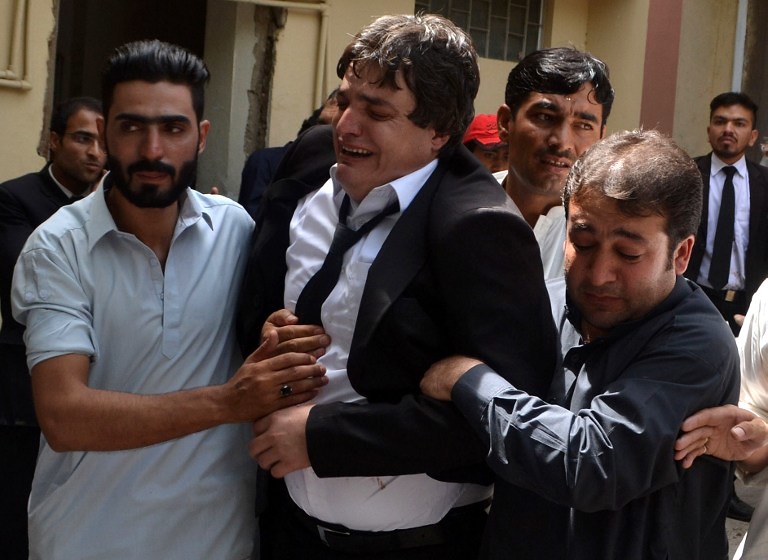
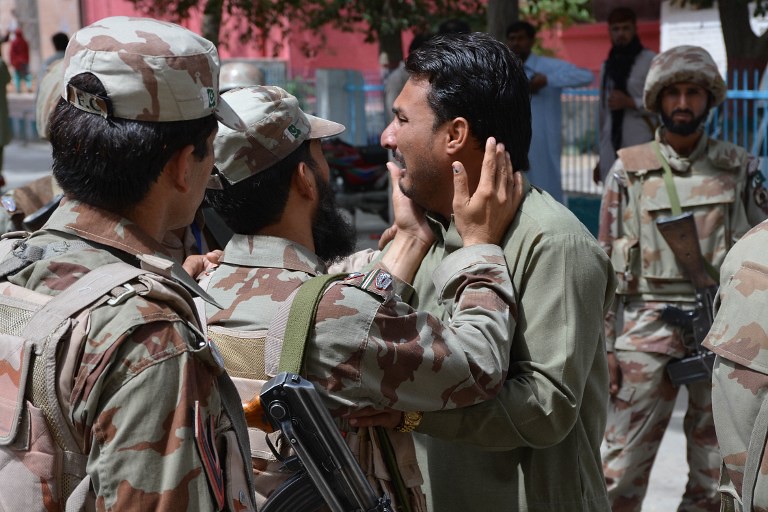
A Pakistani soldier comforts a mourner, Civil Hospital, Quetta [photo Banaras Khan / AFP]: image via alhkaleej online, 8 August 2016
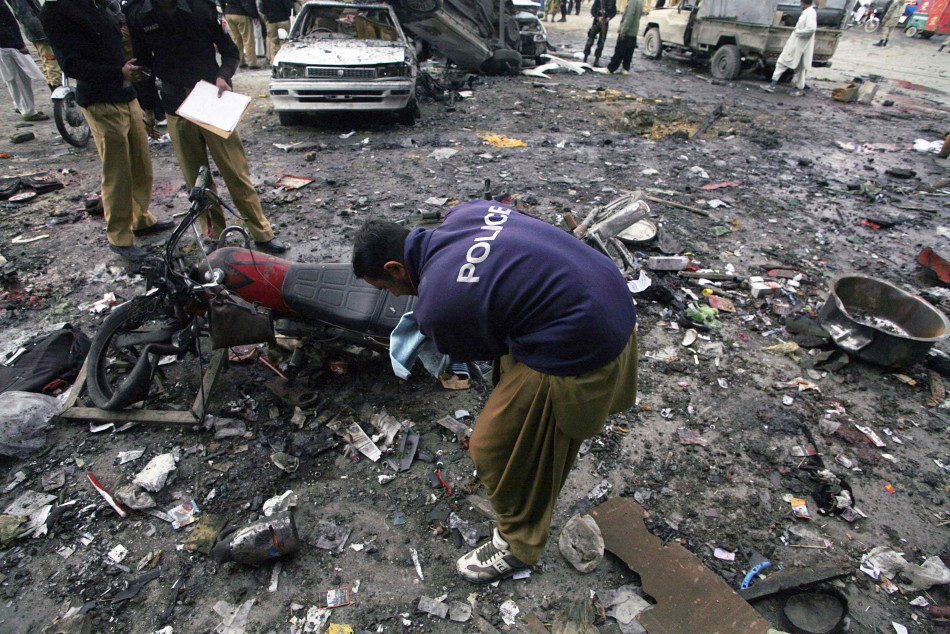
Civil Hospital, Quetta, after the bombing: image via karo4greatness, 8 August 2016

INDIA - Indian fishermen catch fish in the Yamuna River in New Delhi. By @Money_Sharma #AFP: image via Frédérique Geffard @fgeffardAFP, 8 August 2016
Indian workers take a nap near idols of the elephant-headed Hindu god Lord Ganesha at a roadside workshop in New Delhi: photo by Money Sharma/APP, 8 August 2016

A picture taken with a long shutter shows Nepalese Hindu pilgrims, also known as Bolboms, collecting holy water to worship Lord Shiva, the god of creation and destruction, at the Bagmati river in Kathmandu, Nepal: photo by Narendra Shrestha / EPA, 8 August 2016

#haveaniceday #Iran A child raises his hands at #sunset in Mahmoud Abad on June 16. #AFP Photo by Atta Kenare: image via Aurelia BAILLY @AureliaBAILLY, 8 August 2016

#haveaniceday #Kashmir #sunset on Dal Lake in Srinagar on March 30, 2016 #AFP Photo by @TauseefMUSTAFA: image via Aurelia BAILLY @AureliaBAILLY, 7 August 2016


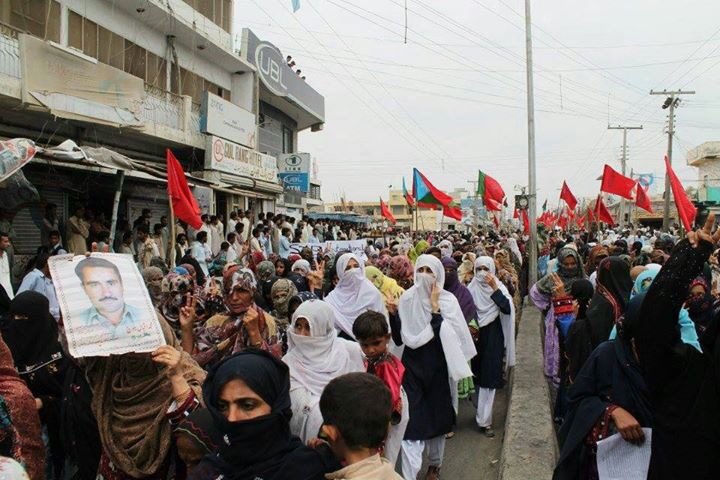


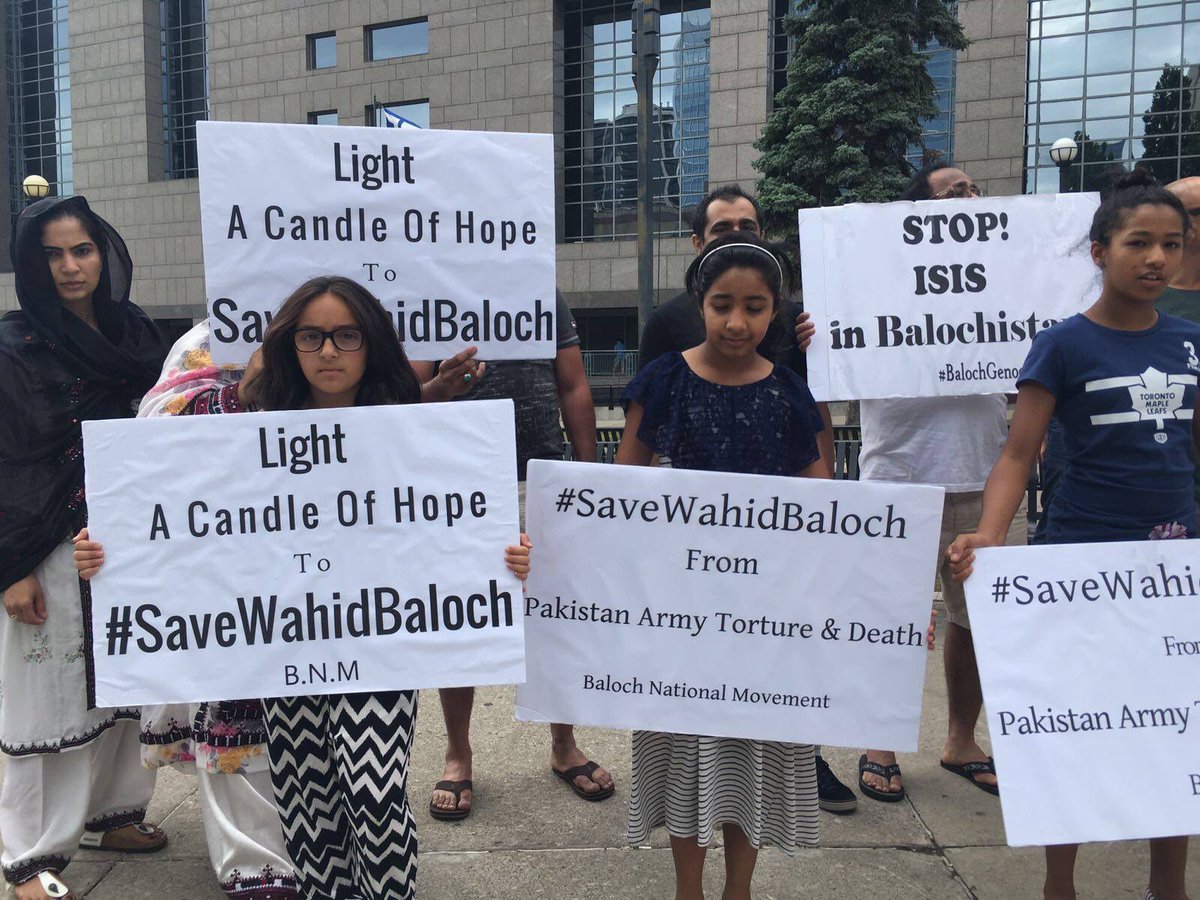
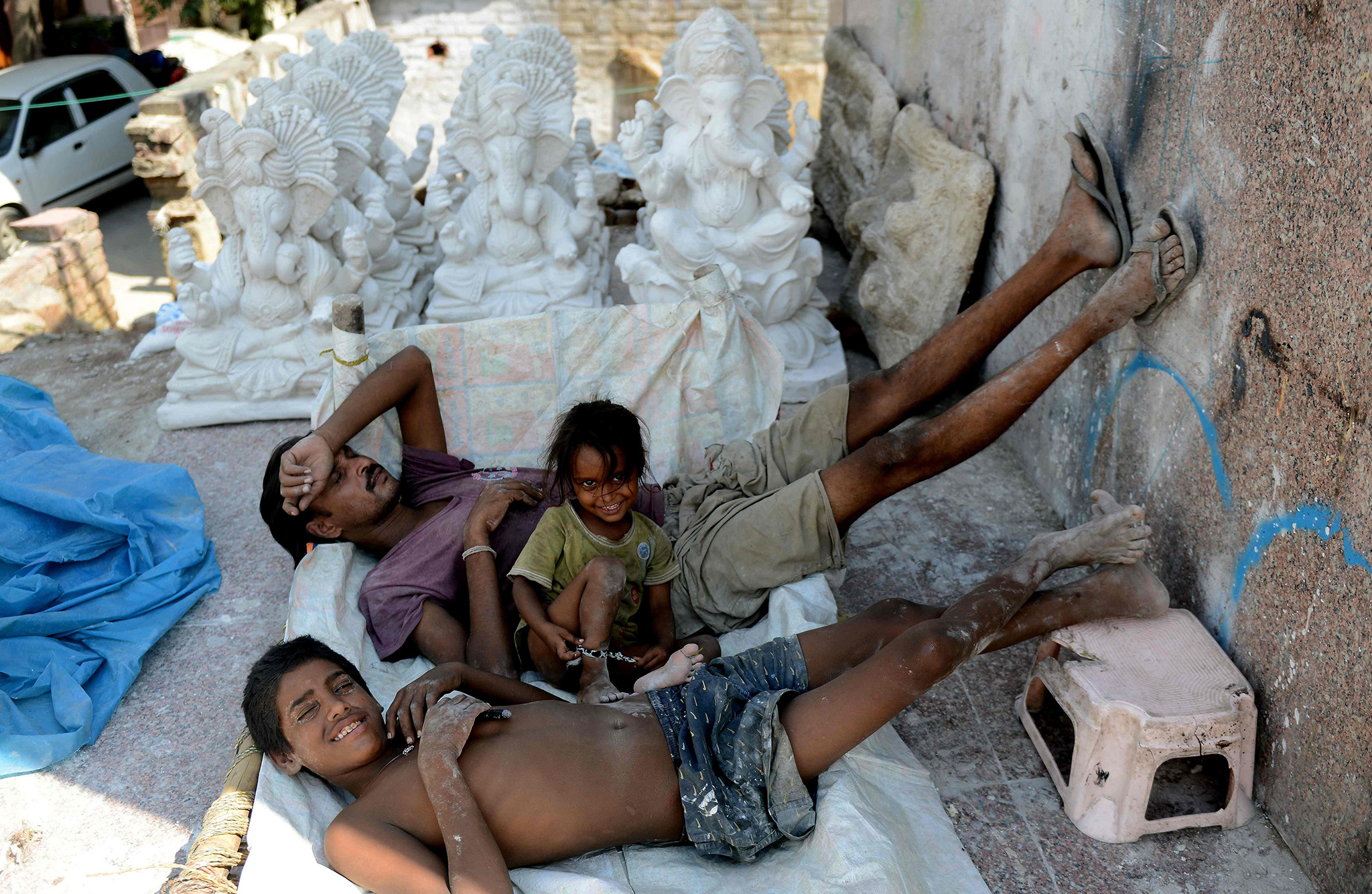
Horror upon horror. The blood-soaked book a telling image. However, I don't understand enough about the Baluchistan issue, which seems to be yet another separatist movement. Clearly, anti-ISIS, etc. Tom, do you know a source?
ReplyDeleteTom, just met a good friend of mine. He works in South Punjab on energy issues. His fellow activist was just assassinated- probably by the ISI- last week. I think you're spot on here. They've created monsters ( and it seems clear, though who knows in these murky waters, that a lot of them are still controlled by the agencies). I hope you understand that I'm reluctant to say much more. At my university we organised a talk on Baluchistan. We were told in no uncertain times by the agencies to close it down. A week later one of the speakers we invited went to speak in a hastily reorganized talk in Karachi. The woman who organised it was gunned down. With China in its only going to get worse.
ReplyDeleteThe fall out of the Saudi-American-Pak military nexus continues...
Hilton and billoo, very grateful for your words always.
ReplyDeleteHilton, thanks for being interested in and also for being honest about being confused about what is, to us here, an incredibly baffling subject.
I know little more about this subject than the next Murican.
billoo on the other hand knows much much more, he is located right there, indeed I believe there was a service today for the Quetta victims in the very city in which billoo works, lives, abides by, respects the book, in much the same sense and ways we out here would hope to do, and many of the same books, so in that sense we're all involved together... though billoo comments under restraint here, perforce, and discreetly; whereas we, Hilton and I are merely routinely surveilled for future reference, billoo is surveilled with a possibility of immediate consequence, so his caution is understandable.
Balochistan, located in SW Pakistan, is that nation's largest (44% of Pakistani landmass), poorest (desperately so, with very low levels of income, education, literacy), least populous (less than 15 m), and most remote province; also its richest in natural resources (natural gas, copper, gold); and, most important, most critically situated in terms of present global geopolitical realities.
"The province is bordered by Afghanistan to the north and north-west, Iran to the south-west, Punjab and Sindh, and Khyber Pakhtunkhwa and the Federally Administered Tribal Areas to the north-east. To the south lies the Arabian Sea. Balochistan is located on the south-eastern part of the Iranian plateau. It borders the geopolitical regions of the Middle East and Southwest Asia, Central Asia and South Asia. Balochistan lies at the mouth of the Strait of Hormuz and provides the shortest route from seaports to Central Asia. Its geographical location has placed the otherwise desolate region in the scope of competing global interests for all of recorded history."
The history, languages, and culture of the people of Balochistan and the Indus Valley are ancient and unique unto the place itself, but at present the economic and political interests of Pakistan determine its fate, and there are many interests and many players. A development deal with China is ongoing and has created targeting opportunities for terror groups. The Indian intelligence service (RAW) has been said by some to be abetting if not, through proxies, actually perpetrating acts of terror in order to destabilize the government of Pakistan. The Pakistan Army and security service however seem to be currently the likeliest candidates for involvement in the insane Quetta atrocity. The seamless shifting and shapechanging and morphing of jihadi groups makes it likely that IS and Taliban are in fact interchangeable brands employed by pretty much the same bunch of actors, who don't want things like books, education (non Sharia), law (secular) to exist in their world. It appears that these gangs are the agents of convenience, though the otherwise unintelligible failure of Pakistan to provide security at an event which exposed virtually the entire legal, journalistic and civil infrastructure of the region, more or less offering up a perfect plum of a target -- which was, indeed, plucked --- is pretty much impossible to explain without bringing in thoughts of complicity.
My entirely uninformed speculation from very far away would be that the government of Pakistan is playing the extremely dangerous game of juggling the violent jihadis, Iranians, Afghans, and so on, playing them off against one another, using some groups as proxies, persecuting or pursuing or pretending to pursue others, with no transparency in any of it, and continuous risk of something happening like this atrocity.
The result of which was:
Death Toll=97 total 62 Lawyers 29 Civilians 02 TV Reporters 01 Doctor 03 Law enforcement staff 171 severely injured
Thanks, Tom and billoo. The murky collaboration between Taliban and Pakistani intelligence services has been well documented, and hideous. It's an incredible crescendo of horror around the entire region, for which the US bears much (although not all) responsibility. What I'll investigate are the issues compelling Baluchi separatism. Are Baluchis Shia (I think so) and feel oppressed by dominant Sunni? How are they exploited? A lot to explore. Again, thanks. And be safe.
ReplyDeleteHilton, I believe the Baloch people are primarily Sunni, at least in Iran, where that fact has been a problem for them.
ReplyDeleteToday...
Uneasy Calm
Please do catch me up on your investigations.
There is an awful lot to explore here, the tribal, ethnic nuances, grudges between valleys and so on, going back to... and then there is now.
We stand together in the darkness out beyond the darkness.